
Top Rated Thermal Compounds for CPU Cooling : Comprehensive Ranking of 90 Products

Ideal Laptops for College Use: Thoroughly Tested Picks for Research, Composing, Gaming, Etc
For a college student, there is no more important tool than a laptop. It’s a catch-all for note taking, studying, homework, collaboration, procrastination (don’t tell your professors) and extracurricular activities. When you pick one, you’re likely choosing a tool for at least four years of education, if not further studies or just life after college.
Picking a college laptop can feel like homework in itself. There are a ton of laptops on the market, and you may get some help by checking out recommendations from your school or department. In our opinion, most students should prioritize portability, battery life and then performance, unless your school recommends something specific.
Going into the Fall 2023 semester, the latest parts in laptops include Intel’s 13th Gen CPUs, AMD’s Ryzen 6000 processors, Apple’s M2 chips and Nvidia’s RTX 40-series GPUs.
If you’re taking classes remotely, be sure to take the webcam into consideration. More and more laptops are finally getting 1080p webcams, which often include higher-quality lenses for better images. (Many, but not all, also have privacy shutters for when you’re not making calls.)
Also, don’t forget get whatever student discounts are available. Many vendors may give you some percentage off, a gift card, or a free extra when you can prove that you’re a student, either with a .edu email address or a college ID card.
Quick College Laptop Shopping Tips
Why you can trust Tom’s Hardware Our expert reviewers spend hours testing and comparing products and services so you can choose the best for you.Find out more about how we test .
- Consider your major or specialization: Science majors and liberal arts majors may have different needs. An engineering major working with computer-aided design software might want a notebook with a discrete graphics card, while students who primarily do research and write papers may be fine with a thin ultrabook. Your school or department may also have recommended specifications (as well as a list of software that you’ll need to run), so be sure to check those out.
- Learn if your work will live locally or in the cloud: Find out if your school or department uses cloud storage, such as Google Drive or Microsoft OneDrive. If they do, you may be able to get by with less internal storage. Of course, if you want your own copies of your work or would like to keep personal files as well as school files, budget for a bit of extra space.
- Weight and battery life matter: After all, you’ll be carrying this laptop around all day in a backpack as you move from class to class. Lightweight and long battery life can both save your back and leave more room for books.
- Consider how you take notes: A good keyboard is always important, especially when you’re writing papers. But some students still prefer to take notes by hand, and those people will want to consider a convertible or detachable 2-in-1 with a stylus.
- See if you can get a student discount: Some stores will offer you a discount with your proof of affiliation with a university or college. It’s also possible that your school will have a relationship with a vendor for deals on certain models. Others may just throw in a gift card or some free earbuds. If you can find a deal, great; school is expensive enough.
Best College Laptops You Can Buy Today
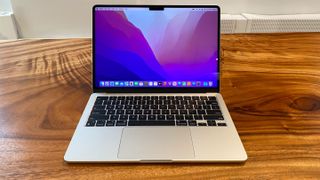
The MacBook Air with M2 is the best college laptop you can buy with a thin design and plenty of power. (Image credit: Tom’s Hardware)
1. MacBook Air (M2)
Popular in the Lecture Hall
☆ ☆ ☆ ☆ ☆
Specifications
CPU: Apple M2 8-core CPU
GPU: 10-core GPU
Display: 13.6-inch, Liquid Retina, 2560 x 1664, True Tone
Weight: 2.7 pounds (1.24 kg)
Today’s Best Deals
Reasons to buy
Sleek, thin new design
M2 is powerful and efficient
Long-lasting battery
1080p webcam
Bright display
MagSafe returns to MacBook Air
Reasons to avoid
-
Starts pricier than previous generation
-
Supports only one external display
-
Display notch will bother some people
The MacBook Air with Apple’s new M2 chip is likely to be one of the most popular laptops on college campuses this fall. Apple has brand cache, and the new Air has the performance and battery life to back it up.
Apple’s new redesign has abandoned the classic wedge in favor of a flatter design reminiscent of the 14-inch and16-inch MacBook Pro , which also includes the MagSafe 3 charger to connect the charger magnetically and save the laptop from spills if you trip over it.
The new MacBook Air also has a nicer display than the prior model and can easily last a day on a charge (it ran for over 14 hours on our test). The1080p webcam is also an upgrade, either for joining remote classes or for video calling family from campus.
This M2 verison starts at $1,299, so those looking to save a bit might want to consider the M1 model, which is still on sale and starts at $999, though it lacks some of the niceties.
Read: MacBook Air (M2) review
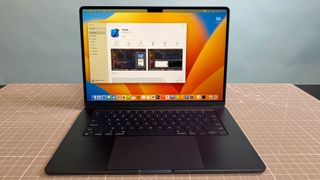
(Image credit: Tom’s Hardware)
2. MacBook Air (15-inch)
Bigger screen, better speakers
Specifications
CPU: Apple M2 8-core CPU
GPU: 10-core GPU
Display: 15.2-inch, Liquid Retina, 2880 x 1864, True Tone
Weight: 3.3 pounds (1.5 kg)
Today’s Best Deals
Reasons to buy
Bigger screen is easier on your eyes
Powerful M2 SOC +Long battery life
Speakers are powerful and offer bass
1080p webcam +Display gets very bright
Reasons to avoid
-
Battery life isn’t much longer than 13-inch model
-
No additional ports over 13-inch model
-
M2 allows for just one external display
If you want a MacBook Air with a bigger screen than the traditional 13-inch offering and don’t need the power of a MacBook Pro, Apple is aiming the 15-inch MacBook Air squarely at you. It feels just like using the smaller machine, except with a bigger display, some more weight, and better speakers. While it’s not as easily portable as its smaller sibling, after years of classes and late-night study sessions, your eyes might think you for the bigger screen.
I wish that Apple took a bit more advantage of the extra room and added an extra port or two. That seems like a missed opportunity. And while I wish the bigger battery added even more longevity than it does, it’s hard to complain when your machine is running over 14 hours on a charge.
Read: MacBook Air (15-inch) Review
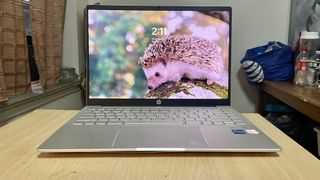
The HP Pavilion Plus 14 is one of the best college laptops thanks to top tier screen specs at a good price. (Image credit: Tom’s Hardware)
3. HP Pavilion Plus 14
A Great Screen at a Great Price
Specifications
CPU: Intel Core i7-12700H
GPU: Intel Iris Xe (Integrated)
Display: 14-inch, 2880 x 1800, 90 Hz, 16:10
Weight: 3.09 pounds / 1.4 kg
Today’s Best Deals
Reasons to buy
16:10 OLED display
Strong port selection
Configurations under $1,000
A capable performer
Reasons to avoid
-
Disappointing battery life
-
Lots of pre-loaded software
You can get a laptop under $1,000 with plenty of trappings. TheHP Pavilion Plus 14 offers strong performance with up to an Intel Core i7-12700H series processor and a beautiful OLED display with a 16:10 aspect ratio. You don’t often find that combination at the $999 price point we reviewed.
There is a bit of a hit on battery with the combination of a high-res OLED screen and an H-series processor. But those may be worth the tradeoff for those who want those high-end features, alongside a suite of ports that include USB Type-C, USB Type-A, HDMI 2.1, a headphone jack and microSD card reader.
For those on a budget, there are non-plus models with 1080p displays that go even lower in price, as well as AMD Ryzen models. The Plus also comes in its own variety of configuration that includ eIntle’ s12th Gen P and U series processors. (The U series likely does the best on battery in a tradeoff for performance, but we haven’t tested that one.)
Read: HP Pavilion Plus 14 review
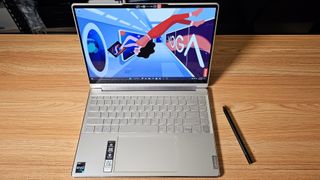
The Lenovo Yoga 9i is one of the best college laptops with great sound and a variety of ports. (Image credit: Tom’s Hardware)
A stunning display
☆ ☆ ☆ ☆ ☆
Specifications
CPU: Intel Core i7-1360P
GPU: Intel Iris Xe
Display: 14-inch, 2800 x 1800 OLED touchscreen
Weight: 3.09 pounds (1.4 kg)
Today’s Best Deals
Reasons to buy
Vibrant OLED display
Strong performance
Active stylus included
USB Type-A and Thunderbolt ports
Reasons to avoid
-
Mediocre Touchpad
-
Stiff keyboard
-
Loud fans
Lenovo’s Yoga 9i gives you a lot of features for the money. While, at $1,399, it’s not exactly a budget ultrabook, you get a stylus, OLED display, 16GB of RAM and a Core i7 P-series CPU even in the base configuration.
The Yoga 9i has a premium aesthetic, thanks to its aluminum chassis and its chrome “Oatmeal” colorway. There’s also a “Storm Gray” colorway that looks more silver. A shiny rounded ring around the sides adds a touch of classiness; the rounded corners are also far more pleasant to touch than the sharp, square corners on many other laptops. The hinge, which contains two of the four speakers, has just the right amount of tension and lets you bend the display back into tent, display and table modes.
If you want a 2-in-1 with a brilliant display, plenty of performance and all-day battery life, the Yoga 9i is a great choice. The 10-plus hours of battery life in our testing is also appreciated, though similarly sized alternatives, like Apple’s MacBook Airs, last a few hours longer on a charge.
Read: Lenovo Yoga 9i (Gen 8) Review
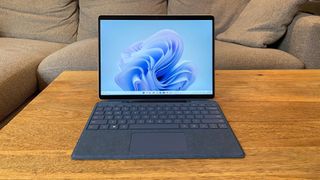
(Image credit: Tom’s Hardware)
 Glarysoft File Recovery Pro - Helps to recover your lost file/data, even permanently deleted data.
Glarysoft File Recovery Pro - Helps to recover your lost file/data, even permanently deleted data.
5. Microsoft Surface Pro 9
For the Dedicated Notetaker
Specifications
CPU: Intel Core i7-1255U
GPU: Intel Iris Xe
Display: 13-inch, 2880 x 1920, 120 Hz PixelSense Flow touchscreen
Weight: 1.94 pounds (0.88 kg) without keyboard
Today’s Best Deals
Reasons to buy
Strong webcam and audio
Type cover keyboard is still top-notch
Vivid, 120 Hz display
Reasons to avoid
-
No headphone jack
-
Keyboard adds a lot to the starting price
There are two versions of theMicrosoft Surface Pro 9 — one with Intel chips and one with Arm. Both come in the same sleek aluminum chassis, though if you want fun colors like blue or green, you have to go for the Intel model.
We feel that most people will want the performance boost from the Intel model, which also has the benefit of starting at a lower price. It has fewer issues with app compatibility because the Intel chips don’t need to emulate any software.
If Wi-Fi doesn’t cover the quad, you may want the SQ3 version, which works with 5G (assuming you have a cellular plan for it). It also has slightly longer battery life, though you should get a day’s charge out of either model.
Microsoft hasn’t changed much with the Pro 9, but it’s still the Windows tablet to beat. It’s still expensive, though, and a keyboard and stylus continue to add more to the cost.
Read: Microsoft Surface Pro 9 review
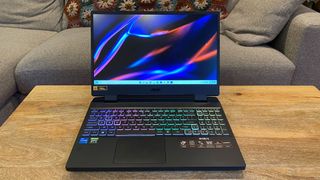
(Image credit: Tom’s Hardware)
6. Acer Nitro 5
For Budget College Gamers
☆ ☆ ☆ ☆ ☆
Specifications
CPU: Intel Core i5-12500H
GPU: Nvidia GeForce RTX 3050 Ti
Display: 15.6-inch, 1920 x 1080, 144 Hz
Weight: 5.51 pounds / 2.5 kg
Today’s Best Deals
Reasons to buy
Affordable
Clean design
Decent performance for the price
Reasons to avoid
-
Way too much bloatware
-
Display is a little washed out
The Acer Nitro 5 proves you can get a solid gaming machine for under $1,000, which is fitting for the gamer on a budget, as long as your expectations for performance are reasonable.
It doesn’t hurt that the Nitro 5’s latest design is a bit more adult. Sure, it still has a backlit RGB keyboard, but without an aggressive design with tons of angles and red accents, it will fit in in the classroom as well as your school’s gaming meetups.
The Nitro 5 also comes with a SATA cable in the box so you can add more storage later. This is a decent way to save money, as laptop companies often charge an arm and a leg for more storage, so those who are handy with a screwdriver can get more storage on the cheap.
Read: Acer Nitro 5 review
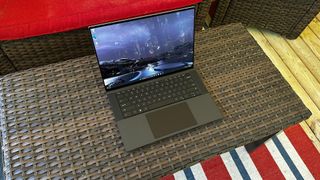
(Image credit: Tom’s Hardware)
7. Dell XPS 15 (9530)
For Sciences, Coding and Video
Specifications
CPU: Intel Core i7-13700H
GPU: Nvidia GeForce RTX 4070
Display: 15.6-inch, 3456 x 2160, 16:10, OLED touchscreen
Weight: 4.23 pounds / 1.92 kg
Today’s Best Deals
Reasons to buy
Vibrant OLED display
Strong performance
Attractive chassis
Reasons to avoid
-
720p webcam
-
Port selection could be better
Dell ’s XPS 15 (9530) isn’t a major upgrade over previous models but includes an attractive and high-quality chassis along with a vibrant 3.5K InfinityEdge OLED display. The webcam (720p) is still subpar, and we’re limited to just three Type-C expansion ports.
In our benchmark suite, the $2,799 XPS 15 was a solid performer, besting everything we put up against it, save for Apple’s 14-inch Macbook Pro. The XPS 15 delivered respectable battery life at just over nine hours per charge. The XPS 15 remains a solid pick among productivity laptops in this class, but the competition isn’t exactly standing still.
Read: Dell XPS 15 (9530) review
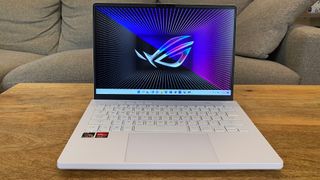
(Image credit: Tom’s Hardware)
8. Asus ROG Zephyrus G14
Power and Battery Life
☆ ☆ ☆ ☆ ☆
Specifications
CPU: AMD Ryzen 9 6900HS
GPU: AMD Radeon RX 6800S
Display: 14-inch 2560 x 1600, 16:10, 120 Hz
Weight: 3.79 pounds / 1.72 kg
Today’s Best Deals
Reasons to buy
Long battery life
Sleek, portable design
Asus finally added a webcam
Surprisingly good speakers
Reasons to avoid
-
Some keyboard touchpoints run uncomfortably warm
-
Pricey
You can use the same laptop for gaming and your studies. The Zephyrus G14, with its AMD Ryzen 9 6900HS and AMD Radeon RX6800S, delivers gaming-grade performance, but also has some features great for working on campus.
For instance, on our battery test, the Zephyrus lasted more than 10 and a half hours, which means you can go through long lecture halls or stints at the library without plugging in (unless you’re gaming, of course). The AMD Advantage model has a 16:10 aspect ratio to show a bit more text, spreadsheets or other work than prior versions.
And while it goes without saying on most laptops, Asus brought the webcam back to this model, for when you need to work remotely or collaborate with others from your dorm room.
Read: Asus ROG Zephyrus G14 review
Finding Discounts on the Best College Laptops
Whether you’re shopping for one of the best gaming laptops or another model that didn’t quite make our list, you may find some savings by checking out our lists ofDell coupon codes ,HP coupon codes ,Lenovo coupon codes ,Razer promo codes orNewegg promo codes .
MORE: How to Buy a Gaming Laptop
MORE: Best Gaming PCs
MORE: Best Ultrabooks and Premium Laptops
Round up of today’s best deals
[](https://images.fie.futurecdn.net/hh3xtiyvqrmx3xkj-16681794209212.jpg “Apple - MacBook Air 13.6”…”) ](https://shop-links.co/link/?publisher_slug=itechdaily19598&exclusive=1&url=https%3A%2F%2Fbestbuy.7tiv.net%2Fc%2F376373%2F633495%2F10014%3Fprodsku%3D6509650%26u%3Dhttp%253A%252F%252Fwww.bestbuy.com%252Fsite%252F-%252F6509650.p%253Fcmp%253DRMX )
Best Buy ](https://shop-links.co/link/?publisher_slug=itechdaily19598&exclusive=1&url=https%3A%2F%2Fbestbuy.7tiv.net%2Fc%2F376373%2F633495%2F10014%3Fprodsku%3D6509650%26u%3Dhttp%253A%252F%252Fwww.bestbuy.com%252Fsite%252F-%252F6509650.p%253Fcmp%253DRMX )
MacBook Air 15.3-inch (M2,… ](https://go.redirectingat.com/?id=92X1584492&xcust=tomshardware%5Fus%5F1321352558288421837&xs=1&url=https%3A%2F%2Fwww.apple.com%2Fmacbook-air%2F&sref= )
Apple MacBook Air 15-inch M2 (2023)
Apple ](https://go.redirectingat.com/?id=92X1584492&xcust=tomshardware%5Fus%5F1321352558288421837&xs=1&url=https%3A%2F%2Fwww.apple.com%2Fmacbook-air%2F&sref= )
Yoga 9i 2-in-1 Intel (14”)”) “) ](https://shop-links.co/link/?exclusive=1&publisher_slug=itechdaily19598&url=https%3A%2F%2Flenovo.vzew.net%2Fc%2F221109%2F797408%2F3808%3Fprodsku%3D83ACCTO1WWUS1%26u%3Dhttps%253A%252F%252Fwww.lenovo.com%252Fus%252Fen%252Fp%252Flaptops%252Fyoga%252Fyoga-2-in-1-series%252Flenovo-yoga-9i-2-in-1-gen-9-%252814-inch-intel%2529%252F83accto1wwus1%26intsrc%3DCATF%255F5733%26subId1%3Dtomshardware-us-1338137037322464017%26sharedId%3Dtomshardware-us )
Lenovo USA ](https://shop-links.co/link/?exclusive=1&publisher_slug=itechdaily19598&url=https%3A%2F%2Flenovo.vzew.net%2Fc%2F221109%2F797408%2F3808%3Fprodsku%3D83ACCTO1WWUS1%26u%3Dhttps%253A%252F%252Fwww.lenovo.com%252Fus%252Fen%252Fp%252Flaptops%252Fyoga%252Fyoga-2-in-1-series%252Flenovo-yoga-9i-2-in-1-gen-9-%252814-inch-intel%2529%252F83accto1wwus1%26intsrc%3DCATF%255F5733%26subId1%3Dtomshardware-us-1338137037322464017%26sharedId%3Dtomshardware-us )
Microsoft Surface Pro 9… ](https://target.georiot.com/Proxy.ashx?tsid=45723&GR%5FURL=https%3A%2F%2Fwww.amazon.com%2Fdp%2FB0CVC31PRN%3Ftag%3Dhawk-future-20%26linkCode%3Dogi%26th%3D1%26psc%3D1%26ascsubtag%3Dtomshardware-us-2420334348680369903-20 )
Amazon ](https://target.georiot.com/Proxy.ashx?tsid=45723&GR%5FURL=https%3A%2F%2Fwww.amazon.com%2Fdp%2FB0CVC31PRN%3Ftag%3Dhawk-future-20%26linkCode%3Dogi%26th%3D1%26psc%3D1%26ascsubtag%3Dtomshardware-us-2420334348680369903-20 )
Acer NH.Q2QAA.012 Nitro 5,… ](https://target.georiot.com/Proxy.ashx?tsid=45723&GR%5FURL=https%3A%2F%2Fwww.amazon.com%2Fdp%2FB073PXNPG7%3Ftag%3Dhawk-future-20%26linkCode%3Dogi%26th%3D1%26psc%3D1%26ascsubtag%3Dtomshardware-us-4729805940146575925-20 )
Amazon ](https://target.georiot.com/Proxy.ashx?tsid=45723&GR%5FURL=https%3A%2F%2Fwww.amazon.com%2Fdp%2FB073PXNPG7%3Ftag%3Dhawk-future-20%26linkCode%3Dogi%26th%3D1%26psc%3D1%26ascsubtag%3Dtomshardware-us-4729805940146575925-20 )
Dell XPS 13 9530 (2023) ](https://shop-links.co/link/?exclusive=1&publisher_slug=itechdaily19598&url=https%3A%2F%2Fwww.anrdoezrs.net%2Fclick-8900246-12578053%3Fsid%3Dtomshardware-us-3167718419036769564%26url%3Dhttps%3A%2F%2Fwww.dell.com%2Fen-us%2Fshop%2Flaptops%2F13th-gen-intel%2Fspd%2Fxps-15-9530-laptop )
Dell ](https://shop-links.co/link/?exclusive=1&publisher_slug=itechdaily19598&url=https%3A%2F%2Fwww.anrdoezrs.net%2Fclick-8900246-12578053%3Fsid%3Dtomshardware-us-3167718419036769564%26url%3Dhttps%3A%2F%2Fwww.dell.com%2Fen-us%2Fshop%2Flaptops%2F13th-gen-intel%2Fspd%2Fxps-15-9530-laptop )
[](https://m.media-amazon.com/images/I/41dzXV4lPsL._SL500_.jpg “ASUS - ROG Zephyrus G14 14”…”) ](https://shop-links.co/link/?publisher_slug=itechdaily19598&exclusive=1&url=https%3A%2F%2Fbestbuy.7tiv.net%2Fc%2F376373%2F633495%2F10014%3Fprodsku%3D6570270%26u%3Dhttp%253A%252F%252Fwww.bestbuy.com%252Fsite%252F-%252F6570270.p%253Fcmp%253DRMX )
Best Buy ](https://shop-links.co/link/?publisher_slug=itechdaily19598&exclusive=1&url=https%3A%2F%2Fbestbuy.7tiv.net%2Fc%2F376373%2F633495%2F10014%3Fprodsku%3D6570270%26u%3Dhttp%253A%252F%252Fwww.bestbuy.com%252Fsite%252F-%252F6570270.p%253Fcmp%253DRMX )
We check over 250 million products every day for the best prices
powered by

- Title: Top Rated Thermal Compounds for CPU Cooling : Comprehensive Ranking of 90 Products
- Author: George
- Created at : 2024-08-19 03:35:49
- Updated at : 2024-08-20 03:35:49
- Link: https://hardware-tips.techidaily.com/top-rated-thermal-compounds-for-cpu-cooling-comprehensive-ranking-of-90-products/
- License: This work is licensed under CC BY-NC-SA 4.0.


.png) Kanto Player Professional
Kanto Player Professional